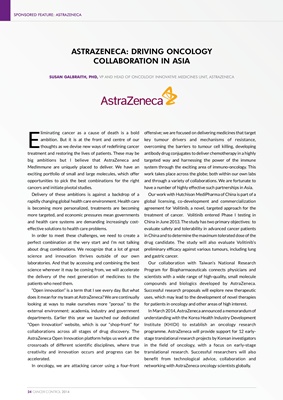
SPONSORED FEATURE: ASTRAZENECA
CANCER CONTROL 2014 25
Around the same time, we also kicked off a collaboration
with Korea's Samsung Medical Center (SMC) for an
innovative, multi-drug clinical trial. It offers gastric cancer
patients the opportunity to receive a novel targeted therapy
based on the molecular profile of their disease, as part of a
personalized health care (PHC) approach. Understanding
which patients are the right ones to treat with novel
medicines based on their genetic changes is a key part of our
development strategy. We are therefore excited to be
working with SMC in bringing the concept of PHC to cancer
patients in Korea.
AstraZeneca and the National Cancer Center (NCC) of
Japan have a comprehensive clinical study agreement to
promote the joint clinical development of anti-cancer drugs.
NCC will promote and participate in joint trials which involve
AstraZeneca's oncology candidates in global, Phase I studies.
In September 2012, the two companies signed a new, fiveyear
master agreement on pre-clinical cancer research.
AstraZeneca also partners with Keio University Medical
School in Japan across a number of clinical oncology projects.
Our global biologics unit, MedImmune, signed its first
oncology research agreement in China with the Shanghai
Chest Hospital back in 2011. The goal is to build a database of
small and non-small cell lung cancer cases.
AstraZeneca is clearly focused on the benefits of
collaborating with Asia's top cancer research organizations
and acknowledges that together, we make a pioneering force
that is greater than the sum of its parts.
My vision is to be as inclusive as possible and to make it
easy to partner and collaborate with AstraZeneca. One of the
ways in which we managed to simplify and expand our
external collaborations was through the creation of what we
call the "Oncology Toolbox". Sharing compounds with
investigators from academia has been accelerated, thanks to
the quick and efficient way in which the Toolbox makes our
compounds available for pre-clinical research.
In the past, only AstraZeneca's contracted partners had
access to the Toolbox. Then, in November 2012 we opened
the toolbox up to academic institutions with whom we had no
established working relationships. Since then, it has proved
popular with external research institutions. It has enhanced
AstraZeneca's reputation as a collaborative organization and
brought new research opportunities to light.
The Toolbox is bringing benefits to the company and
external investigators, who have benefited from fast access
to the compounds and the targets they were aimed at. It gives
them the chance to carry out high quality research to
investigate cancer signaling pathways, evaluate novel
combinations, develop novel cancer models, test new
indications, discover novel biology and test hypotheses.
AstraZeneca has shared its compounds with academia in
the past, but the Toolbox has expedited the process. It used to
take an average of 154 days from receiving an application to
shipping the material; now it takes an average of 66 days. The
timeline has gone down by 57%, giving investigators
confidence that they will have rapid access to molecules and
making AstraZeneca their first stop for experimental
material. The number of applications has gone up by 40%
over the last twelve months.
So what's made the Toolbox so successful? At the heart of it
all is a simplified Materials Transfer Agreement (MTA)
template. This has fewer restrictions than a standard
contract, which enables easier negotiation. Applicants use
the template to request material via email. They submit a
research proposal stating which compound they want and
the hypothesis they want to test to an Oncology External
Science Manager, who reviews their request. Lastly, lawyers
for both parties negotiate an MTA.
The Toolbox is truly global: 88 proposals have been
approved since the start of 2013, from 12 different countries.
The approval rate for compound requests to date is over 90%.
In December 2012, during the initial phase of the
programme rollout in Asia, we introduced the programme to
eight centres in four countries: Singapore, Korea, Japan and
China. As of today, we have received requests for 23
compounds. Of these, 17 have already been delivered or
approved and one is still under review.
One of the best examples of a Toolbox success came via a
request from Professor Byoung Chul Cho at Severance
Hospital of Yonsei University in Korea. He requested
AZD4547 in order to do biomarker studies on sqCC and
SCLC PDX models. This Toolbox collaboration led to a
decision by AstraZeneca to fund the proposal and test the
hypothesis in the clinic.
I have no doubt that it is only by working together and
sharing our scientific expertise that we stand the best chance
of one day reaching our bold ambition of eliminating cancer
as a cause of death. l
For more information
www.astrazeneca.com